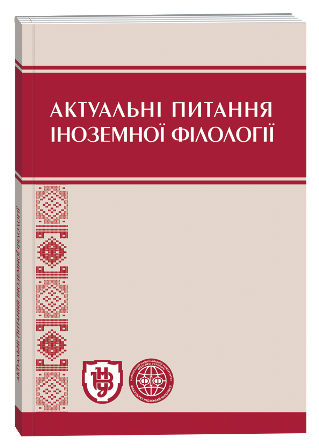МЕТОДИКА ДОСЛІДЖЕННЯ ЕТИМОЛОГІЧНОГО ВИМІРУ АНГЛОМОВНОЇ ЛІНГВОЕТИЧНОЇ СИСТЕМИ
DOI:
https://doi.org/10.32782/2410-0927-2023-19-2Ключові слова:
домен, етимологічний профіль, етична категорія, концептуальна база, орієнтир, траєктор.Анотація
Стаття входить до серії наукових праць автора, присвячених проблемі висвітлення внутрішньої форми базових англомовних лінгвоетичних категорій. Метою дослідження є висвітлення особливостей аналізу етимологічного виміру англомовної лінгвоетичної системи методом етимологічного профілювання. Об’єкт дослідження є англомовна лінгвоетична система, а предметом виступають особливості методики етимологічного профілювання. Англомовна лінгвоетична система визначається як фрагмент мовної картини світу, який категоризує та концептуалізує досвід міжособистісних відносин у морально-аксіологічній площині. Було доведено, що основу етимологічного профілювання складає траєкторно-орієнтирна кореляція, яка відображає шлях семантичної еволюції номінативних засобів мови й віддзеркалює «когнітивний шлях» процесів категоризації та концептуалізації дійсності, а також пояснює вибір конкретної мовної оболонки для окремих лінгвоетичних категорій. Кореляція траєктора та орієнтира в ономасіологічному сенсі полягає в тому, що одна або декілька когнітивних ознак цільового домену (траєктор), яким виступає етичний концепт, асоціативно співвідносяться із когнітивною ознакою / ознаками домену-джерела (орієнтиром). Етимологічний профіль включає в себе дві зони: безпосередню та розширену. Безпосередня зона представлена когнітивним змістом домену-емітера, тоді як розширена концептуальна база включає також когнітивний зміст більш схематичного етимологічного домену, відносно якого домен-емітер профілюється. Запропонована методика є дієвим інструментом для висвітлення етимологічних профілів англомовних лінгвоетичних категорій, оскільки вона дозволяє встановити особливості їх первинної категоризації та концептуалізації. Отримані результати можуть бути застосовані для характеризування змін, які відбуваються в об’єктивації етичних категорій і концептів у сучасній англомовній картині світу, включаючи їх окремі лінгвосоціокультурні відмінності.
Посилання
Веремчук Е. О. Nature of the Basic English-Language Ethical Categories: linguocognitive approach. Актуальні питання гуманітарних наук : міжвузівський збірник наукових праць молодих вчених Дрогобицького державного педагогічного університету імені Івана Франка. 2021. Т. 1. № 37. C. 93–99.
Веремчук Е. О. Лінгвокогнітивні та лінгвосинергетичні аспекти об’єктивації етичних категорій в англійській мові. Запоріжжя : ЗНУ, 2022. 560 с.
Пампура С. Ю. Критерії етимологічного дослідження запозиченої лексики (лінгвоісторіографічний аспект). Науковий вісник Міжнародного гуманітарного університету. Серія : Філологія. 2014. №. 9. С. 142–144.
Скляренко В. Г. Дослідження з етимології та історичної лексикології української мови : До 80-річчя від дня народження. Київ : Наукова думка, 2018. 687 с.
Скоробогатова О. О. Поетична актуалізація внутрішньої форми слова. Лінгвістичні дослідження : збірник наукових праць Харківського національного педагогічного університету імені Г. С. Сковороди. 2021. Вип. 54. Ч. 1. С. 185–196. DOI : 10.34142/23127546. 2021.54.1.16
Таценко Н. В., Воронько А. В. Перекладацькі аспекти відтворення концептів ДОБРО/GOOD та ЗЛО/EVIL у романі Террі Пратчетта і Ніла Геймана «Добрі передвісники». Вчені записки ТНУ імені В. І. Вернадського. Серія : Філологія. Соціальні комунікації. 2019. Т. 30 (69). № 4. Ч. 1. С. 111–116.
Clausner T. C. Domains and image schemas. Cognitive Linguistics. Berlin, 1999. № 10/1. P. 1–31.
Evans V. Cognitive linguistics: An Introduction. Edingburgh : Edinburgh University Press, 2006. 830 p.
Fillmore Ch. Frame semantics. Linguistics in the Morning Calm. Seoul, 1982. P. 111–137.
Johnson M. Metaphor: An Overview / ed. by M. Kelly. Encyclopedia of Aesthetics. Oxford : Oxford University Press, 1998. V. 2. P. 208–212.
Lakoff G., Johnson M. Metaphors we live by. Chicago : University of Chicago Press, 2003. 128 p.
Langacker R. A course in cognitive grammar. Manuscript. Preliminary draft. San Diego : San Diego University Press, 2000. 573 p.
Langacker R. W. Cognitive grammar. A basic introduction. Oxford : Oxford University Press, 2008. 562 p.
Langacker R. W. Foundations of cognitive grammar. Theoretical prerequisites. Stanford : Stanford University Press, 1987. Is. XI. 516 p.
Maia A, Nascimento S. The concept of Evil in Psychiatry: Philosophy, neurobiology and clinical implications. European Psychiatry. 2022. DOI : 10.1192/j.eurpsy.2022.1726.
Malanyuk M. S., Barnych I. I., Svydnytska-Ilkiv N. V. The concept of evil in A. Christie’s detective stories. Науковий журнал ЛДУ БЖД «Львівський філологічний часопис» : зб. наук. праць. 2018. № 4. С. 75–78.
Petryk T. V. Concept “evil” in channeling-discourse. Науковий вісник Дрогобицького державного педагогічного університету імені Івана Франка. Серія : Філологічні науки (мовознавство). 2018. № 9. С. 151–154. URL: http://nbuv.gov.ua/UJRN/nvddpufm_2018_9_36.
Rosch E. Natural categories. Cognitive Psychology. Amsterdam, 1973. V. 4. P. 328–350.
Scragg G. Semantic nets as memory models / ed. by E. Charniak, Y. Wilks. Computational Semantics. Amsterdam : North Holland Publishing Co, 1976. P. 101–127.
Etymology Dictionary. URL : https://www.etymonline.com/.
Oxford English Dictionary. URL : https://www.oed.com/.







